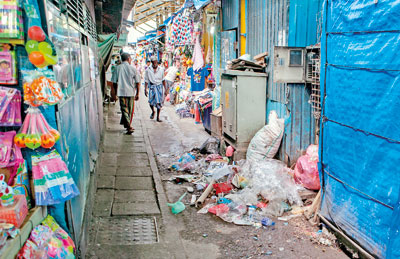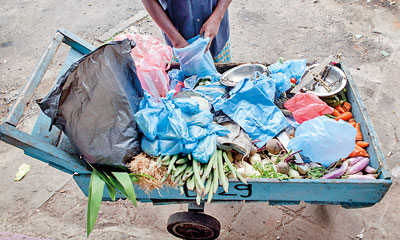News
‘Good’ polythene makers lose out as baddies skip around rules
Major polythene bag makers who turned to the production of biodegradable polythene bags and compostable lunch sheets following the government’s ban on high-density products say they are losing money while smaller businesses flout the rules and grab their business.

Plastic and polythene: Persistent, pernicious products (file)
The Polythene Manufacturers and Recyclers Association (PMRA) said its members had transformed the industry by changing their machines and equipment to produce hydro-biodegradable polythene bags/wrappers and compostable lunch sheets. Millions of rupees had been spent on the machinery changeover, association President Anura Wijethunga said. Now, to their dismay, these companies find it hard to sell their products as customers were buying the cheaper, illegal alternatives.
Mr. Wijethunga said because the illegal products (high-density polythene and lunch sheets) were freely available, people had returned to their old habits. Demand for the legal product had not developed. He accused the Central Environment Authority (CEA) of failing to do its job of efficiently policing backyard polythene cottage industries.
“At the beginning of the year, there was a good demand for our products as people thought the government was serious about the ban but with time the fear has waned and people are openly defying the law,” he said. Mr. Wijethunga said the CEA could not implement the law strictly as it lacked the equipment to gauge the thickness of suspect polythene products. Legal polythene should be 20 microns or more but miscreants get away easily with passing off their products as legal.
While errant cottage industries were having a field day, genuine stocks lay unpurchased in stores, attracting vermin and cockroaches due to the starch content in the lunch sheets.
“We spent Rs.700 for a kilo of raw material. Around 500 metric tons of raw materials are still lying unused in factories. There are no sales and we are going slow on production. I have almost 16 tons remaining out of 32 tons imported in February this year. Over the past four months, only 16 tons have been used,” Mr. Wijethunga said.
He charged the CEA with making insufficient preparations before bringing in the ban. Although huge sums had been spent on advertising the ban the CEA had failed to educate the public on the importance of choosing bio-degradable polythene.
The PMRA chief said the failures had created a bad image for President Maithripala Sirisena, whose vision it had been to eliminate non-biodegradable polythene in the country. Mr. Sirisena brought in a law banning polythene as far back as 2007 when he was the minister for the environment.
When the ban was proposed the industries had advocated going for oxo-biodegradable polythene, which needed only an addition of a chemical to the polythene mixture to make it environmentally acceptable.

Smaller businesses flout the rules (file)
The government, however, was insistent on hydro-biodegradable low-density polythene. This forced the industries to change their machines, which cost “colossal sums”, Mr. Wijethunga said.
Millions had been spent and the government’s promise to reimburse 50 per cent of the cost up to Rs. 200,000 a machine had not eventuated. “We are still waiting for reimbursement,” the PMRA leader said.
Further, Mr. Wijethunga, said, the government had also not abided by its promise to grant tax concessions on the raw materials. “Now we pay around Rs.120,000 tax on one metric tonne of raw material, and our end product is priced high. If we get our tax concession we can offer lunch sheets at Rs.1.25 per sheet. Right now, the sheets cost up to Rs. 2.50,” he said.
Exploiting the situation, small traders have jacked up the price of non-compostable lunch sheets to around Rs.1 a sheet in retail shops. Before the ban, it was sold at .30 to .50 cents a sheet.
CEA Director of Waste Management Ajith Weerasundera said the authority had been zealous in trying to control the manufacture of illegal polythene but admitted it had failed.
“Raiding has not been effective and now we want to give power to police to raid industries resorting to production of high-density polythene,” Mr. Weerasundera said.
“Next week, we hope to carry out the raids jointly with the police.”
Previously, although raids had been carried out along with the environmental police, their role had simply been to assist the CEA. From next week, Mr. Weerasundera said, the police will be given powers to charge and take legal action against the wrongdoers.
The CEA has inspected some 2,500 establishments – manufacturers, traders and users (restaurants and eateries) in the past five months and found 139 of them making, selling or using high-density lunch sheets and bags. Legal action has been instituted against 125 of these establishments.
But, says Mr. Weerasundera, “miscreants are slipping through the net” because the CEA, lacking the needed equipment during raids, is using a chemical to test whether polythene bags are bio-degradable as claimed.
The CEA will renew public awareness campaigns on polythene as many people are misled into buying the illegal product. Bulk buyers are requested to check with the CEA on the genuineness of the product.
Errant industries will be charged under National Environmental Act No. 47 and could face being shut down. Other penalties include Rs.10,000 fines or two years of imprisonment, or both.
Ministry of Provincial Council and Local Government, National Solid Waste Management Support Centre Director A.B. Illangasinghe said the volume of discarded lunch sheets had not decreased and it was necessary to continually educate people on the harm polythene lunch sheets could do to the environment. “It is important to stop the availability of high-density polythene bags and lunch sheets completely,” he said.

